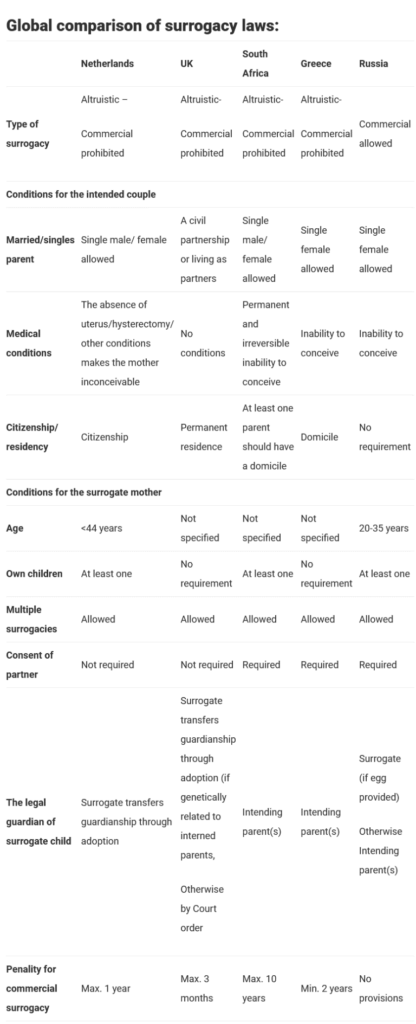-Satvik Shukla
Table of Contents
Introduction
Every parent’s ambition is to have a child at some point in their lives, but some are fortunate enough to have one naturally, and for others who are not, the only option is surrogacy.
What is Surrogacy?
The ‘Surrogate’ word has its origin within the Latin term ‘Surrogatus’ meaning a woman acts as a substitute for another woman. If we go by the medical terminology then surrogacy is defined as the process or arrangement of someone giving birth to someone else.
Monetary remuneration may or may not be involved in surrogacy partnerships. Commercial surrogacy is defined as receiving payment for the arrangement. The legality and expense of surrogacy vary greatly between nations, which can lead to difficult international or interstate surrogacy arrangements. Couples seeking a surrogacy arrangement in a nation where it is illegal may travel to a jurisdiction where it is legal. Surrogacy is permitted in various nations if no money is exchanged.
Types of Surrogacy
There are two types of surrogacy –
- Traditional surrogacy
- Gestational surrogacy
- Traditional Surrogate
The father’s sperm is used to artificially inseminate a lady. They will then carry and deliver the baby for you and your spouse to raise.
The biological mother of the baby is a conventional surrogate. This is because their egg was fertilized by the father’s sperm. Donor sperm is also one option.
- Gestational surrogate
In vitro fertilization (IVF) currently allows for the collection of eggs from the mother (or an egg donor), fertilization with sperm from the father (or a sperm donor), and placement of the embryo into the uterus of a gestational surrogate.
The baby is then carried by the surrogate until delivery. Because their egg was not utilized, they have no genetic links to the kid. The “birth mother” is a gestational surrogate. However, the biological mother is still the woman whose egg was fertilized.
Conditions to be a surrogate mother are:
- The woman chosen for surrogacy must be a close relative of the parents who will take the child after the birth.
- It is essential that the Surrogate mother must be a married woman and should also have at least one child of her own.
- The age of the surrogate mother should be between the age of 25-35 years.
- She can go to become a surrogate mother only once and must possess a certificate of physical and mental fitness for surrogacy.
- There should have insurance coverage for the Surrogate mother for some time to cover a period of pregnancy as well as for the period after that.
- The act also gives directions for the regulation of the functioning of surrogacy clinics.
- All surrogacy clinics in the country should be registered.
- It also specifies that no sex selection can be done when it becomes to surrogacy.
The legal context of Surrogacy
Surrogacy has been practiced in India since its inception but the catch is that till 2001 all this process was illegal. In 2002, the Atal Bihari Vajpayee government introduced commercial surrogacy in India. The medical industry has taken off in recent years and is estimated to be worth $2.3 billion market. It is difficult to estimate the number of children born to surrogates in India, but it is thought that more than 25,000 children are now living in this way. Half of these children are from the West. The low cost of the service enables an excessive use of the service by parents who come from various other countries. The Indian Council of Medical Research (ICMR) issued guidelines in 2002 legalizing surrogacy but did not pass legislation endorsing the practice. According to a report in July 2012 United Nations-sponsored study, the surrogacy business is worth more than $400 million and there are over 3,000 fertility clinics nationwide.
The 228th report of the Law Commission of India recommends that commercial surrogacy be prohibited and that ethical altruistic surrogacy be allowed by enacting a suitable legislation. One of the main reasons that surrogacy services are so popular in India is poverty. This makes poor Indian women desperate to rent their wombs for money or other essential commodities.
Case Laws
- Baby Manjhi Yadav vs. Union of India & Anr (2008)
Bench: Justice Arijit Pasayat and Justice Mukundakam Sharma
In this case, a Japanese couple, Dr. Ikufumi Yamada, traveled to India to have a baby through surrogacy. They were very happy with the process and the results. They then hired an Indian woman to be a surrogate mother for a child who lived in Gujarat, where the practice was pioneered. Because of some marital dispute, both ended up taking divorced, but father wanted the custody of the child. However, according to Indian law, a single father cannot adopt a girl child. The Supreme Court justice Arijit Pasayat and justice Mukundakan Sharma give custody of the girl child to her grandmother, based on the analysis that there is a need for regulated surrogacy laws in the country.
- Jan Balaz vs. Anand Municipality
Bench: K.S Radhakrishnan, C.J., and Anant S. Dave
In 2008, a German couple hired a surrogate mother to give birth to two twins. The twins were born in good health, and both parents were pleased with the results. This German couple worked in the UK and now their two twins need an Indian passport to travel. The German couple is currently unable to travel with their twins due to their lack of an Indian passport. Since the twins didn’t have citizenship because their case was still pending in court, the passport authorities refused to grant them passports. And in Germany, there wasn’t a law regulating surrogacy at the time. Supreme Court did not grant the petitioner the right to give a passport to the children, but instead gave them an exit permit, which the German authorities then allowed them to adopt. The petitioner is fighting for the children’s rights.
- Justice K.S Puttaswamy and ANR vs. Union of India
The court held that the issuance of infertility certificates infringes the right to privacy, stipulates the obligation of the local medical association to provide infertility certificates, and conducts infertility treatment from the moral and ethical perspective of society. I have found it to be the opposite. This fundamental right must be protected.
Surrogacy bill 2016
Until 2016, over 2,000 infants were born each year through commercial surrogacy. Several instances have also revealed surrogate mother exploitation. They were kept in hostels during their pregnancies and were not allowed to meet their families. Some women were doing it repeatedly for a pittance, putting their own bodies in danger. According to the 228 Law commission report, commercial surrogacy should be prohibited exclusively in Ukraine, Russia, and California. The provision of the new bill (Surrogacy bill 2016) put an end to commercial surrogacy and made it punishable by up to 5 years imprisonment. The bill allows only altruistic surrogacy for married couples. The bill also comes with an age barrier for both males and females i.e. 23-50 for females and 26-55 for males. It also limits the option of surrogacy to legally married childless couples who have been trying for a child for at least 5 years. The indirect and the main aim of the bill is to safeguard built-in against the sex selection of babies, which also includes the watchdog i.e. national and state boards will be the regulating bodies. The earlier version provided for a minimum jail term of 10 years for some offenses, the present one sets a maximum of 10 years.

Surrogacy bill 2019
The Surrogacy (Regulation) bill 2019 was introduced by the Ministry of Health and Family Welfare, in Lok Sabha on July 15, 2019. The bill provides for the constitution of surrogacy boards at the national as well as state levels to ensure effective regulation.
It also stipulates a separate eligibility criterion for the surrogate mother-
- The surrogate must be a close relative of the intending couple and be a married woman having a child of her own.
- She should be between the age of 25-35 years, not have been a surrogate earlier, and must be certifiably mentally and physically fit.
The bill welcomes the stand of appropriate authority i.e. the central and state governments shall appoint one or more appropriate authorities within 90 days of the Bill becoming an Act.
The functions of the appropriate authority include:
- granting, suspending, or canceling the registration of surrogacy clinics;
- Enforcing standards for surrogacy clinics;
- Investigating and taking action against breach of the provisions of the Bill;
- Recommending modifications to the rules and regulations.
The registration regarding surrogacy clinics is also one of the clauses in the bill – Surrogacy clinics cannot undertake surrogacy-related procedures unless they are registered by the appropriate authority. Clinics must apply for registration within a period of 60 days from the date of appointment of the appropriate authority.
The national and state surrogacy board will get more power this time – The central and the state governments shall constitute the National Surrogacy Board (NSB) and the State Surrogacy Boards (SSB), respectively.
Functions of the NSB include-
- advising the central government on policy matters relating to surrogacy
- laying down the code of conduct of surrogacy clinics
- Supervising the functioning of SSBs.

CONCLUSION
Surrogacy is a commonly known fact that requires legal regulation. There is no debate about whether surrogacy, which is loaded with bioethical considerations, deserves regulation: it does. The Surrogacy (Regulation) Bill, 2019, should have been passed years ago. Historically, regulations in the areas of child adoption and human organ donation have yielded fruit, essentially putting an end to widespread commercial transactions and establishing a system through which any excursions outside of the law may be shut down. The act of 2019 appears to be more encouraging in terms of demand as well as surrogate mother care. The act is also the need of the hour as India is widely popular in terms of surrogate mothers because of its cheap infrastructure. For example, connecting government and NGOs to make it worthwhile at the grassroots level; regular checks for surrogacy clinics; a monthly allowance for mother from either NGO or government in addition to receiving it from the parents; a complete and in-depth database should be prepared for future aspects; and finally, all state and central government hospitals should have a separate ward for the surrogate mother which they can access without any hindrance and with 24*7 help. I think whatever the government has brought till now will soon be proved worth it, and it also shows that the government takes care of its people as well. Thank you.
- https://www.circlesurrogacy.com/about/what-is-surrogacy
- https://www.webmd.com/infertility-and-reproduction/guide/using-surrogate-mother
- https://www.scobserver.in/reports/k-s-puttaswamy-right-to-privacy-judgment-of-the-court-in-plain-english-i/#:~:text=On%2024th%20August%2C%202017%20a,a%20fundamental%20right%20to%20privacy.
- https://www.juscorpus.com/surrogacy-in-india-landmark-judgments/
- https://www.iasparliament.com/current-affairs/surrogacy-regulation-bill-2016#:~:text=The%20Bill%20allows%20only%20altruistic,for%20at%20least%205%20years.
- https://prsindia.org/billtrack/the-surrogacy-regulation-bill-2019
- https://www.thehindu.com/opinion/editorial/great-expectations/article59779682.ece
- https://www.thehindu.com/news/national/outsourcing-child-birth-will-allow-me-to-live-freely-says-petitioner-who-has-challenged-surrogacy-law/article65493389.ece
- https://www.tribuneindia.com/news/editorials/new-surrogacy-rules-406652
- https://www.businesswire.com/news/home/20220810005560/en/HSBC-Introduces-New-Fertility-Treatment-Surrogacy-and-Gender-Affirmation-Benefits
Legal Thirst has created a telegram group for exchanging legal knowledge, Events, and various opportunities.
You can click on this link and join:
Follow Legal Thirst on Instagram and Subscribe to our YouTube channel for more amazing legal content.



